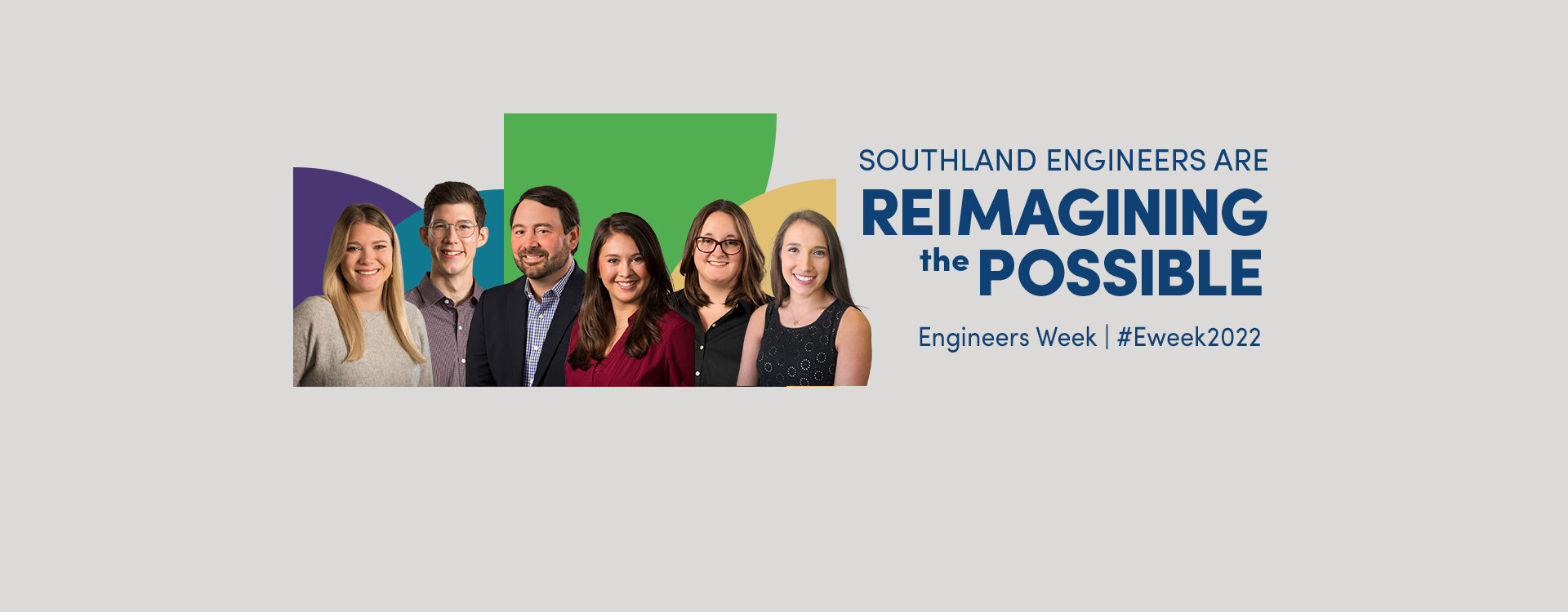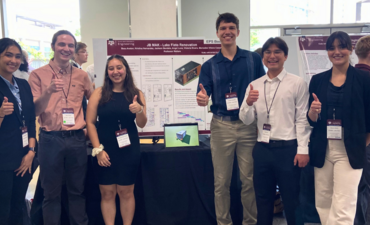
In celebration of Engineers Week, we are recognizing the critical work of engineers, technicians, and technologists. This year's theme is "Reimagining the Possible," which highlights how engineers develop and innovate seemingly impossible technologies to change the way we live. As part of our celebration, we're highlighting seven of our engineers and sharing their responses about their experiences.
Respondents:
Greg Fisher: Design Engineer I
Mary Conrad: Project Engineer II
Brooke Fedder: Project Engineer II
Jackie Rhodes: Design Engineer II
Marc Antonioli: Engineering Manager
Janay Griego: Design Engineer II
Matthew Aviles: Design Engineer II
How does your work relate to the "reimagine the possible" theme of Engineers Week 2022?
Mary Conrad: Oftentimes, the simplest things that we do every day have flaws that we just deal with or overlook because "it has always been done this way." When you take a step back and consider if a particular process or procedure can be improved, if it is really working for you, who might be using that process, and how we can make it easier for them, you get a more streamlined, efficient solution that can also impact project outcomes and the company's bottom line.
Marc Antonioli: When you stop and think about what a project will look like at completion (before it's even begun), it's easy to picture a brand-new piece of custom air handling equipment sitting in a mechanical room. Unfortunately, this isn't always the most economical or logistically feasible solution, so we have had to truly reimagine the possible to solve a customer's problem. At the end of the day when you look at that completed effort, it might look a little different, but you know that what you did was a well-thought-out collaborative solution that made a difference.
Matthew Aviles: I believe engineering involves learning how something can be done, but also how it can be improved or revised as technology develops. As new technologies are introduced into the industry we work in, it allows us to review similar projects and explore or reimagine how they can be built better with newer applications.
Jackie Rhodes: At Southland, we are always challenged to be innovative and collaborative. With these two core values embedded in all aspects of our work, we can push boundaries and develop new industry practices and standards.
What project or engineering solution are you most proud of?
Greg Fisher: I recently had the opportunity to collaborate with an external engineering partner and our construction team to find a cost-effective piping solution for one of our client's industrial process systems. Through listening to input from our field experts, communicating proactively with our client and partners, and using the basic modeling tools I have as an engineer, I was able to help the team converge on a more constructable design. I took great satisfaction in seeing the final product being installed in the field, but I am most proud of the way that the process brought the team together to find a solution that everyone could feel good about at the end of the day.
Janay Griego: I'm most proud of my role as an engineer on the Washington D.C. Convention Center COVID hospital conversion project. It was a fast paced, pop-up emergency facility in response to the pandemic, which required project delivery in an extremely condensed timeframe. We only had 22 days to design and complete installation of HVAC, plumbing, medical gas, and fire protection.
Brooke Fedder: I was an integral team member for BMI's largest, true design-build opportunity, which started construction just as the pandemic began. Throughout the project, I established a rapport with the GC and other trades that helped us achieve our goals. Because of this, I was trusted to close out the project essentially on my own.
Matthew Aviles: I've recently worked on getting to permit a 285,000 square foot light industrial facility. Industrial facility projects are something new in my career, so it was a fantastic learning experience. I look forward to the project moving into the construction phase.
What challenges did you have to overcome to complete the above project or solution?
Greg Fisher: When our construction team expressed their concerns over the piping design, I wholeheartedly agreed that a better solution could be found, but I was afraid to propose a revision because the client had already given the current design their approval. I didn't want to slow down the progress that had been made or be asked "why is this only just coming up now," but at the end of the day it was the right thing to do, and thankfully I received support from the team to tackle one more revision.
Janay Griego: The timeframe was the biggest challenge on the D.C. Convention Center COVID hospital. The team was sending in final equipment submittals for procurement within four days into the start of our notice to proceed on the design side. Every hour counted and we had a team dedicated to providing the best possible product while everyone was also in the midst of the pandemic and adapting to new information on COVID protocols.
Brooke Fedder: Equipment lead times significantly increased throughout the project, which prompted our team to come up with creative solutions to meet the project's deadlines. The major equipment was due to arrive just two short weeks before our goal of providing temporary heat by the close of 2020. We coordinated with the roofing contractor to install our gas lines prior to the arrival of the units, ahead of the roof completion, to successfully meet our goal.
Matthew Aviles: The recent light industrial facility project that I worked on involved taking techniques and electrical experience that I have learned from previous projects and applying them to a much larger scale, which challenged me to learn what was applicable or not to the project.
Did you learn anything from this project or solution that you can utilize for future challenges?
Brooke Fedder: Healthy working relationships with those involved in a project is an instrumental factor in a project's success. The ability to talk through an issue or challenge to come up with a path forward is key.
Jackie Rhodes: Being an engineer, learning takes place every day. Whether it is from pushing boundaries in respect to engineering skillsets or to the multi-trade coordination and collaboration required to execute large scale projects. What I love most is that no day is ever the same and you are able to utilize your problem-solving skills to approach any challenges you may face.
Marc Antonioli: After having success on a number of air handling unit renovations, I feel better equipped to discuss project scheduling and execution strategy. This skillset is important regardless of the project or the duration of time made available to complete the project. Above all else, I learned that if you are able to provide innovative solutions, existing customers and potential customers are always willing to listen.
Mary Conrad: When you take the time to look at a process from everyone's point of view as a team, you get a more holistic, streamlined, and efficient solution to a problem. For example, we frequently have process improvement meetings that result from lessons learned on projects.
Proposal Specialist
As Proposal Specialist, Alex Michael collaborates with our Mid-Atlantic business development team to support the proposal process. This includes coordinating requests for proposal (RFP) preparation involving scope, resumes, project experience, organization charts, and any collateral and supporting documentation.



